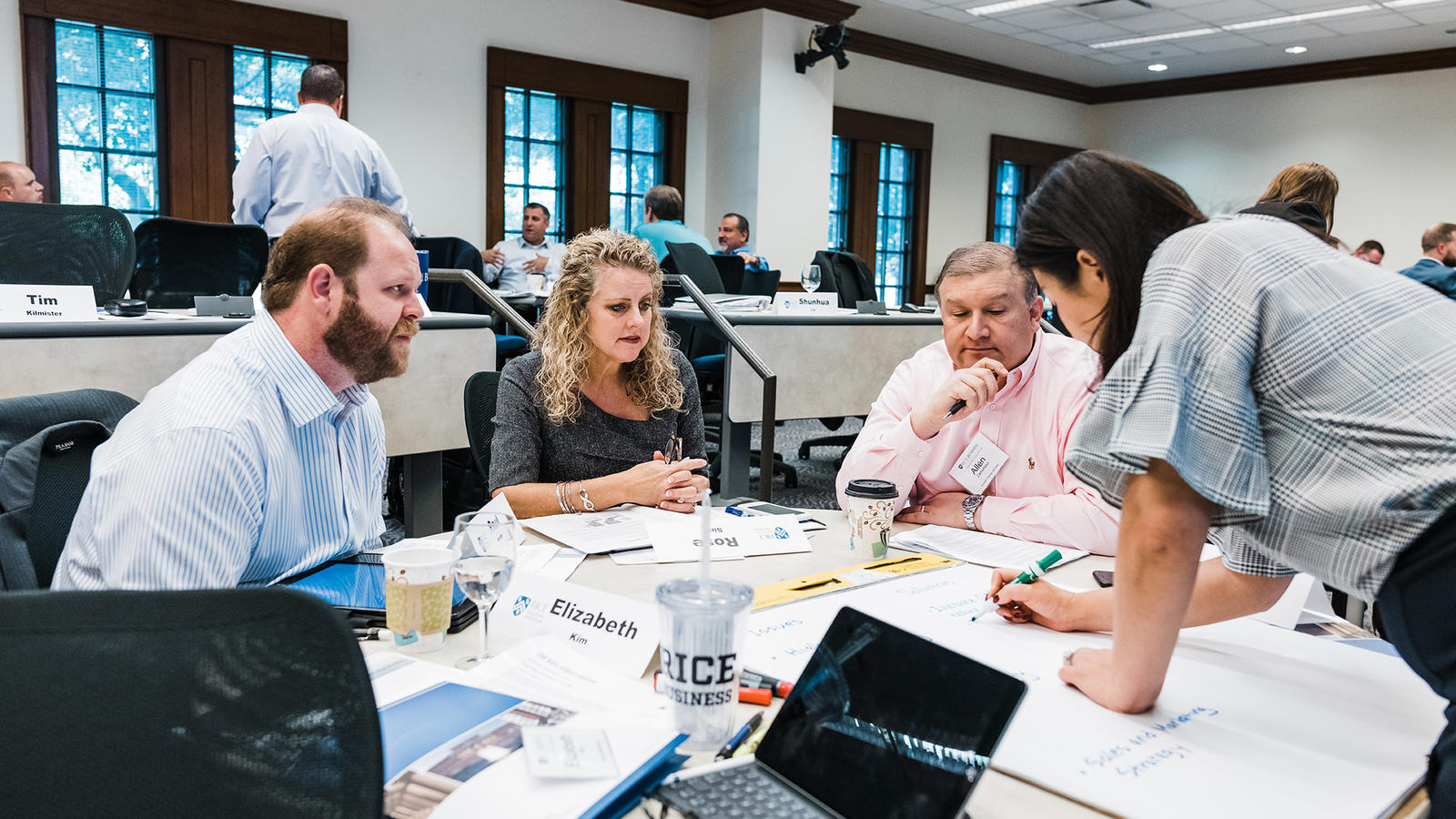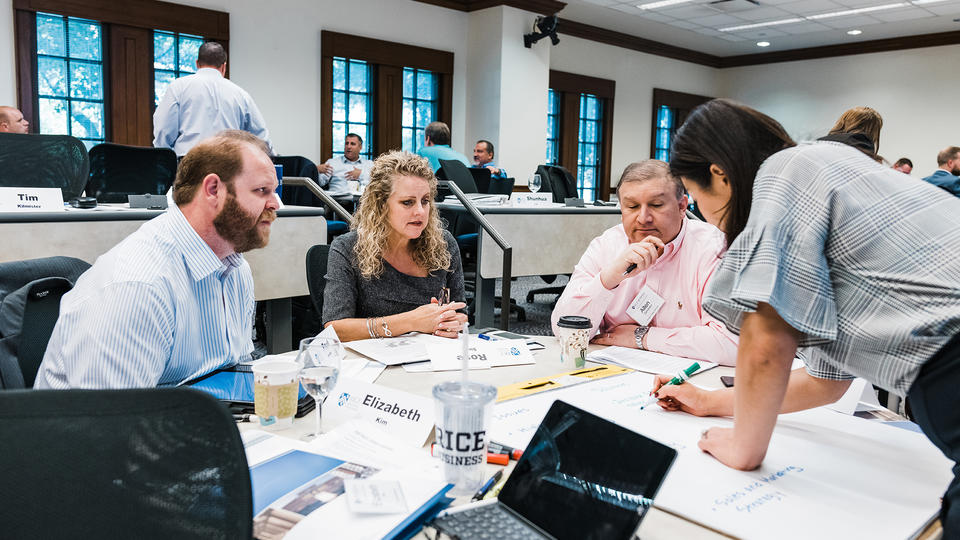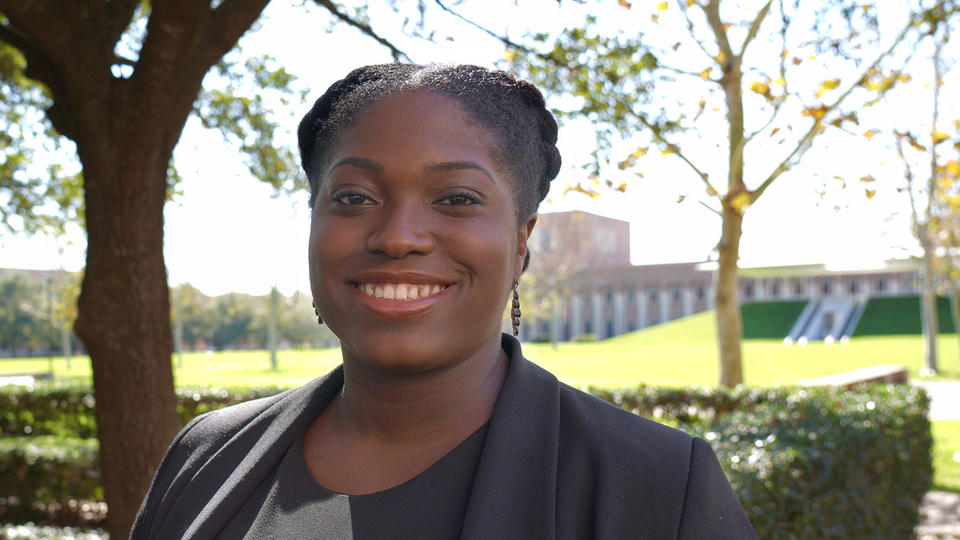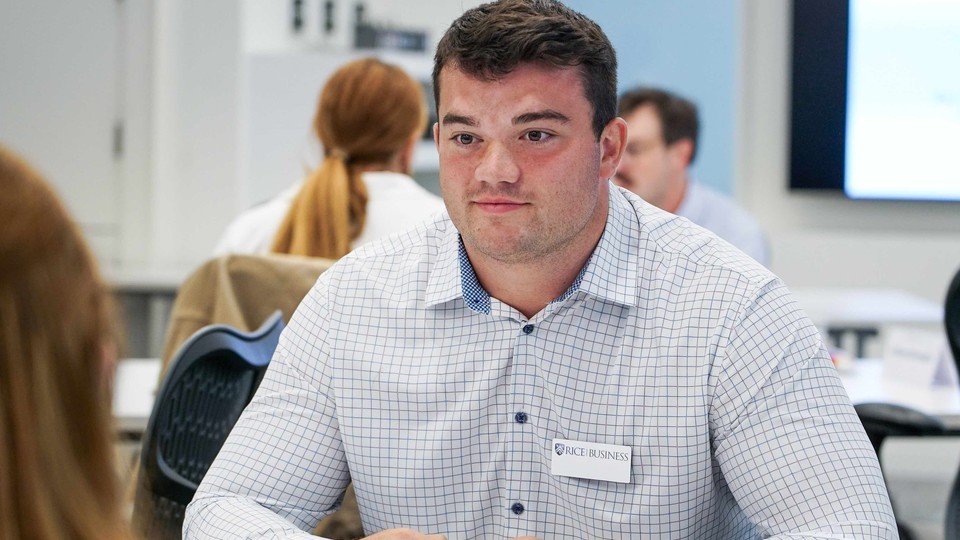Executive education for all is goal at Rice this spring
Rice University’s Jones Graduate School of Business believes executive education should be available to all levels, not just senior-level executives. That philosophy guides the school’s upcoming executive education courses this spring, which include the Corporate Innovation Certificate and B2B Marketing Strategy: A Customer-Centric Approach.


Rice University’s Jones Graduate School of Business believes executive education should be available to all levels, not just senior-level executives.
That philosophy guides the school’s upcoming executive education courses this spring, which include the Corporate Innovation Certificate, May 11-13, and B2B Marketing Strategy: A Customer-Centric Approach, June 9-10. Both courses are grounded in scientifically proven approaches in an interactive learning environment to equip participants with comprehensive and practical frameworks to achieve their goals, program leaders said.
Executive education early in careers, before bad habits are formed, empowers business professionals to not only do their job more effectively but to see how their role fits into the bigger picture, said Michael Koenig, Rice Business associate dean for innovation initiatives and executive director of the school’s executive education program.
“Markets will always go up and down, but one investment always pays long-term dividends — investment in talent development,” said Koenig, who added that the Management Incubator program completes Rice Business’ executive education leadership portfolio, which serves the needs of first-time supervisors through senior executives.
All Rice Business executive education faculty members teach full time in the MBA and Executive MBA programs and have extensive business or consulting experience. These award-winning professors’ real-world understanding and practice provide a depth of comprehension that elevates the experience for their selectively admitted students.
For more information about Rice Business degree programs and executive education, go to https://business.rice.edu.
For more information about and insights from Rice Business faculty research, visit the school’s Rice Business Wisdom website, https://business.rice.edu/wisdom.
SXSW reeling from cancellation as company assesses losses
Peter Rodriguez, dean of Rice University's Jones Graduate School of Business, said the annual festival has "a significant impact on the standing of the city and on the perception of Austin as a regional hub of technology and creativity," benefits that will be difficult to reproduce if the event can't continue. "Anytime you lose a brand, that's costly," Rodriguez said. "That would be a big loss for Austin and for Texas."
Americans are being mean to each other. Trump and the fight for the Democratic nominee are making it worse. [Opinion]
The likelihood of contagion is even higher when the person behaving badly is in a position of power, says Marlon Mooijman, a professor of organizational behavior at Rice University’s Jones Graduate School of Business. “Some research has shown that abusive practices (such as bosses humiliating others and using degrading language) tend to trickle down in organizations.,” Mooijman says.
Powder Keg
Social media and real-life violent protests.


Based on research by Marlon Mooijman, Joe Hoover, Ying Lin, Heng Ji and Morteza Dehghani
Social Media And Real-Life Violent Protests
- It’s possible to predict some violent public protests by tracking social media posts on moral outrage over a triggering event.
- Violence is more likely when social network discussions include groups of like-minded participants. It’s less likely when there is a greater variety of participants.
- Overall social network traffic discussing an event does not predict potential violence, but traffic focusing on the moral wrongness of the event does, especially if it’s not challenged.
Every grade school teacher knows that student conduct can get out of hand, fast, when a group of kids eggs on one individual. Time-outs are a testimony to the power of isolating one 10-year-old from a choir of buddies.
Social media plays a role similar to a gang of hyped-up grade schoolers, providing a community that can express collective disapproval of people or events. When this disapproval has a moral cast — for example, after a police shooting or the removal of a statue — the social network’s particular characteristics are key predictors about whether that disapproval will turn violent.
There is a word for the way group support of a belief system makes it seem worth fighting for: moralization. Tracking social network activity now makes it possible to measure the chances for an individual belief to become moralized by a group — a phenomenon known as moral convergence.
In a recent study in Nature, Rice Business Professor Marlon Mooijman, then at the Kellogg School of Management, joined a team that analyzed when and how violence erupts in protests. In a series of observation and behavior experiments that mixed psychology, organizational theory and computer science, they accurately predicted how violence is influenced by group discussion of moral views on social media.
The researchers started by studying the number and content of tweets linked to the Baltimore riots in 2015, after the death of Freddie Gray in police custody. The researchers then compared these tweets with the number of arrests in a given timeframe, using a methodology developed by Marlon Mooijman and Joe Hoover from the Brain and Creativity Institute at the University of Southern California.
To analyze the tweets responding to Gray’s death, they first separated them into two sets: Those with moral commentary and those without moral judgments.
Next, the researchers tracked whether tweets with moral content increased on days with violent protests. Violence was measured using the number of police arrests, which the researchers compared with the specific timeframes of moral tweets.
There was no major difference in the overall tweet traffic discussing Freddie Gray’s death on days with violent protests and on peaceful days. The number of moralizing tweets, however, clearly correlated with episodes of violent protests, rising to nearly double the moralizing tweets on days with no violence.
This raised a provocative question. Were morally-based tweets a response to the events of the day — or were they somehow driving the violence?
To find out, Mooijman and Hoover worked with computer scientists Ying Lin and Jeng Ji of Rensselaer Polytechnic Institute and Morteza Dehghani of the University of Southern California to develop algorithms that could establish mathematical probabilities for the results.
For every single-unit increase in moral tweets over a 4-hour period, the researchers found, there was a .25 corresponding increase in arrests.
The researchers then tried to measure the effect of similar moral views — such as a social media page with self-selected members of a similar political affiliation — had on violence during protests.
To do so, they set up a second study, which measured participant reactions to the protestors of a far-right rally in Charlottesville, Virginia in 2017. Participants ranked their level of agreement over the morality of protesting the rally.
There was a direct relationship between believing a protest action was moral, the researchers found, and finding violence at that protest acceptable. This relationship held true throughout the study, regardless of political orientation.
The researchers’ next goal was to identify the impact of exposure to people of like beliefs. To do this, participants rated their feelings when they were told that most people in the U.S. shared their views. While the intensity of participants’ moral views created the potential for violence, the researchers found, violence resulted when only actively validated by others with similar views.
Having one’s moral outrage supported by others on social media, the professors concluded, may explain the spike in violence in recent protests.
While respect for privacy remains critical, governments and law enforcement can use the social media trend to pinpoint the moments when moral outrage can turn deadly. Perhaps most importantly, however, the research also suggests practical tactics for calming violent tendencies before they get out of control. To reduce real-life protest violence, they wrote, it’s critical that social media sites include a variety of voices. It’s another reason, if any were needed, that a bit of judicious exposure to other views is healthy for everyone.
Marlon Mooijman is an Assistant Professor of Organizational Behavior. He teaches in the undergraduate business minor program and MBA full-time program.
To learn more, please see: Mooijman, M., Hoover, J., Lin, Y., Ji, H., & Dehghani, M. (2018). Moralization in social networks and the emergence of violence during protests. Nature Human Behavior, 2, 389-396.
Never Miss A Story
Keep Exploring
Will online MBAs boost diversity in business schools?
Lizette Melendez grew up in El Paso, one of the poorest cities in Texas, and was the first in her family to go to university. Now she is part of the first cohort in the MBA @ Rice, launched by Houston’s Jones Graduate School of Business at Rice University in 2018 on the 2U online learning platform.
Rice U. energy expert: Oil and gas industry’s ‘defensive’ history influences approach to climate change
As the climate debate heats up ahead of the 2020 elections, the country’s oil and gas companies want to get in front of the curve. But they may be hampered by a longstanding culture of playing defense, according to an energy industry expert at Rice University’s Jones Graduate School of Business.


As the climate debate heats up ahead of the 2020 elections, the country’s oil and gas companies want to get in front of the curve. But they may be hampered by a longstanding culture of playing defense, according to an energy industry expert at Rice University’s Jones Graduate School of Business.
Bill Arnold, professor in the practice of energy management at Rice Business and a former energy industry executive, is available to comment on the issues at play at the intersection of corporate interests and culture and public policy.
“The oil and gas companies want to get ahead of the curve but want to avoid claims of greenwashing, so their investments in renewables, both research and operations, are more bite-sized,” Arnold said. “Of course, that generates criticism by contrasting tens of millions of dollars of investments for renewables against hundreds of millions and billions for oil and gas. The majors have a record of falling into defensive mode when criticized, and it’s built into the DNA of many older executives. But this is being challenged by their own younger employees as well as activists.”
The European majors came under pressure from ethical investors and environmentalists earlier than their U.S. counterparts and should be positioned better to deal with environmental challenges, Arnold said.
“A number of majors, European and U.S., made big commitments in research — Exxon Mobil with algae in the hundreds of millions of dollars — or operations — Shell in wind energy in West Virginia — without being able to commercialize or generate adequate returns,” Arnold said. “Carbon capture and storage is a silver bullet that’s still far from commercial at scale.”
Arnold added that the skill sets of Big Oil are in geosciences and mechanical engineering, not so much electrical engineering. “The most adaptable skill is project management, where the majors routinely have made multibillion-dollar commitments,” he said. “This could lend itself to large offshore wind projects that can build on offshore exploration.”
Arnold stressed, “There’s a huge gap in what is believed to be feasible over a 20-year period. The majors lay out their view of energy transitions in their scenarios and forecasts. They see continuing rapid decline of coal and, in the U.S., nuclear power. They accept that oil is likely to plateau in a couple of decades, but that natural gas plays a critical role in the transition. The great pressure on that comes from methane emissions, which is a complex issue.”
Rice has a VideoLink ReadyCam TV interview studio. ReadyCam is capable of transmitting broadcast-quality standard-definition and high-definition video directly to all news media organizations around the world 24/7.
To schedule an interview with Arnold, contact Jeff Falk, director of national media relations at Rice, at jfalk@rice.edu or 713-348-6775.
Follow the Jones Graduate School of Business on Twitter @Rice_Biz.
Follow Rice News and Media Relations on Twitter @RiceUNews.
Are accelerators becoming a trap for startups?
The impact of accelerators remains open to debate, according to research co-authored by Yael Hochberg, Rice University’s Ralph S. O’Connor Professor in Entrepreneurship. Some researchers have found accelerators help startups grow, attract venture capital and add a spark to the innovation ecosystem. Other researchers, however, found the effects on a young company’s performance are muted or even negative.
Four Tips to Get Ahead With Your MBA Application
We know the MBA app can seem daunting and we're here to help you. Here are some tips from a Rice Business alum.

MBA Application Tips: Planning Ahead Is the Key to Success
We know the MBA application can seem daunting and we're here to help you. Check out these application tips from Rice Business alum Ashley John. Follow her advice when applying for the MBA and increase your chance of success:
- Take the GMAT/GRE early so you can shift your focus to the rest of the application and ensure you've completed each part to the best of your ability.
- Make sure your essay truly reflects your unique perspective and voice.
- Trust the process and remember that your application will be reviewed comprehensively, meaning that no part is more important than the others.
- Conduct thorough research on your potential professors to make an informed choice of school for your MBA.
Look here for more information about the Rice MBA application process.
Interested in Rice Business?
You May Also Like
Destination Unknown
Should your company set up an overseas R&D site?


Based on research by Haiyang Li, R. Michael Holmes Jr., Michael A. Hitt, Kaitlyn DeGhetto and Trey Sutton
Should Your Company Set Up An Overseas R&D Site?
- Setting up foreign research and development centers can create lucrative new markets.
- But the risks are real: When establishing a new R&D center, location matters.
- Multinational corporations that set up shop overseas must be vigilant about their intellectual property.
Setting up a research and development center abroad can be a brilliant move. Thriving foreign R&D hubs can lead to growth, new technologies and hungry new markets. Foreign R&D also comes with plenty of risks: Choose the wrong spot and your multinational firm could spend more than it makes. How should corporations choose where to go?
In a paper, Rice Business professor Haiyang Li joined a team of colleagues to analyze the ups and downs of foreign R&D. While the study focused on China, they noted that their findings could apply to multinationals considering other locales.
To conduct the study, Li and his team studied data from 164 multinational corporations between 1998-2012. The researchers focused on publicly-traded U.S. corporations, because public companies offered more accessible data and because more U.S. corporations have R&D centers in China than do any other countries.
Because moving corporate R&D to other countries is an established trend, the data clearly showed its advantages. The main perk: a chance to tap into the new country’s resources, including its people, materials and culture. In China, the enormous population combined with an explosion in higher education has created especially fertile ground for R&D staffing — even though hundreds of multinationals have already moved in. Cisco Systems is one such business: Its R&D facility in Shanghai now employs 100 Chinese telecommunications engineers.
Access to material resources and an understanding of local culture both help immensely — first in the early R&D phase and then in development and marketing of new products. This strategy worked well for Caterpillar, which used its China-based R&D center to help establish a Chinese market for their heavy machinery. Establishing foreign R&D centers also helps firms tap into wider global markets. Opening a research center in China, for instance, is more than just a push into that market, the researchers wrote: It can be part of a larger, global strategy.
While foreign R&D centers are by now a longstanding trend, deciding when and where to set them up has been surprisingly haphazard, the researchers wrote. Recent history shows that choosing well requires weighing a daunting array of economic, political and cultural factors.
So where does a shrewd manager start? From an economic perspective, the researchers advised, prioritize a host country with strong growth indicators — especially if your company might enter markets in that country. From a political angle, look for countries with proven, long-term political stability. Finally, you’ll need sophisticated information about the economic and political realities in different parts of a country. In a nation as vast as China, for example, choosing the right region for your R&D center is as almost as consequential as choosing the right country.
A less tangible, but enormously important, consideration is the role of intellectual property or IP. Since a company’s IP is its lifeblood, it’s vital that its host country provide real, enforceable legal protections. China in particular is notorious for shoddy IP protections, leading to rampant bootlegging and other forms of idea theft. While new laws theoretically protect intellectual property, companies should still seek assurance that these laws would be enforced.
Last on the multinational to-do list: take logistical and cultural challenges seriously. For firms based in the United States, moving people and materials around the world needs careful cost-benefit calculations. And that’s only half of the equation. To succeed in a foreign culture, multinationals then need to fully research, understand, and honor the new host culture.
Despite all these challenges, and the very real cost when companies fail to meet them, globalized R&D is booming. To help companies avoid mistakes, Li and his colleagues wrote, future researchers need to pinpoint exactly when, where and for whom global R&D really works. There’s clearly a market for such research. Whether measured in airline miles, shipping containers or even financial ledgers, multinationals are clearly finding overseas R&D worth the risks.
Haiyang Li is a professor of strategic management and innovation at the Jones Graduate School of Business at Rice University.
To learn more, please see: Holmes Jr., R., Li, H., Hitt, M., DeGhetto, K., Sutton, T. (2016). The Effects of Location and MNC Attributes on MNCs' Establishment of Foreign R&D Centers: Evidence from China. Long Range Planning, 49, 594-613.
Never Miss A Story
You May Also Like
Keep Exploring
Beware the hospital ads: Consumers caught in insurance battles
Houstonians care disrupted because fewer hospital systems can bargain with more insurers. Vivian Ho is the Baker Institute Chair in Health Economics at Rice University and professor at Baylor College of Medicine





